How often do you take a cat to the vet? – the frequency of vet visits depends on the cat’s age and overall health.
For example, a senior cat with a hyperthyroid condition must visit the vet every few months for a health check and blood tests to monitor her condition. In contrast, a kitten needs to visit the vet every month or so for the first six months to get her initial vaccinations, first booster shots, parasite control, and weight checks
You’ll need to take your feline friend to the vet clinic for routine vaccinations and health checks, if she gains or loses weight dramatically, when behavioral changes occur for no obvious reasons, and when your pet is sick. In addition, you’ll need to have your cat health-checked before airline travel to certain countries, and for parasite prevention advice.
It’s advisable to take your cat to the vet if she develops a tummy upset, breathing problems, sleeps much more than usual, or stops eating. Those symptoms are often caused by a health condition that requires veterinary treatment and shouldn’t be ignored.
In some cases of minor illness, you can treat your cat at home, and you can definitely help them recover post-surgery. However, we always recommend contacting your vet for advice when your cat is sick.
To learn more about when you should take your cat to the vet and how often, keep reading this helpful guide!
How Often Do You Take A Cat To The Vet?
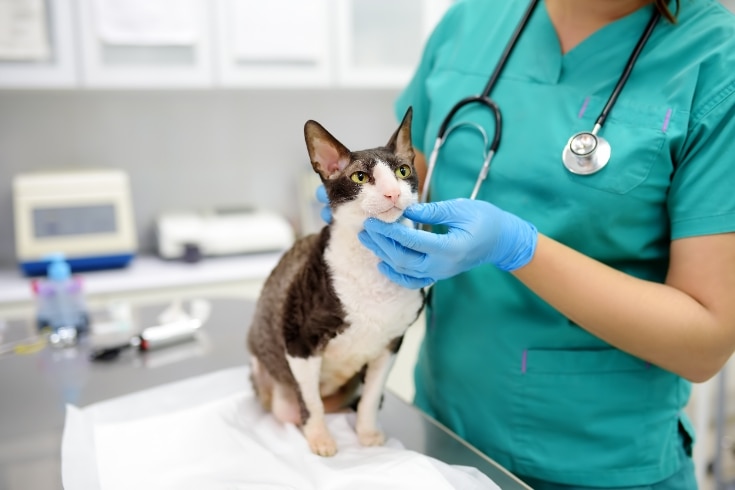
The frequency of vet visits for your cat depends on various factors such as her age, overall health, and any pre-existing medical conditions.
For example, a senior cat with hypertension might need to visit the vet every few months for health checks, while a kitten requires monthly visits for the first six months for vaccinations, booster shots, and weight checks.
It is important to take your cat to the vet for routine vaccination boosters, as well as when you notice any significant changes in her behavior or health. Additionally, cats that are sick, have gastrointestinal issues, respiratory symptoms, skin and coat problems, eye or ear issues, or changes in litter box behavior should be taken to the vet in case underlying health problems are to blame.
How Much Is A Vet Visit For A Cat?
Vet fees vary widely, depending on the reason for the visit. However, you usually pay for an initial consultation with the vet, and any treatment is extra. Vet fees can vary by area and practice size, so it can be worth shopping around before you settle on a particular vet practice.
The following table gives you an idea of the cost of vet visits for common ailments and how much is a cat check-up.
| Short Term Illness | Average for Cats | Top 10% Most Expensive Price for Cats |
|---|---|---|
| Gastroenteritis | $500 | $1,047 |
| Vomiting | $873 | $3,230 |
| Weight loss | $500 | $912 |
| Respiratory condition | $485 | $2,216 |
| Loss of appetite | $200 | $370 |
| Lethargy | $1,900 | $4,691 |
| Lump | $770 | $1,268 |
| Diarrhea | $588 | $1,900 |
When To Take Cat To Vet?
You should take your cat to the vet if her booster vaccinations are due and for routine parasite prevention checks and medication. In addition, if your cat shows any signs of sickness, such as gastrointestinal problems, breathing trouble, or unusual lethargy, you should have her checked by a vet.
In this part of our guide, we provide an overview of when to take your cat to the vet and how much those visits will likely cost.
Routine Check-Ups
Your cat will need regular veterinary check-ups, depending on her age and health. The cost of these vet visits will vary between practices and the purpose of the visit.
Read on to learn more about the main reasons for vet visits and how much your furry friend is likely to cost you in vet bills!
Annual Checkups
Your cat needs annual check-ups with the vet. These visits are usually incorporated into your pet’s routine vaccination booster appointments unless she has a health condition that needs monitoring.
During a routine check-up, the vet will check your cat’s vital signs, examine her ears, eyes, and tummy, and check her skin for allergies and parasites. A dental examination will also be carried out.
The average charge for a routine check-up costs between $50 and $100.
Kitten Visits
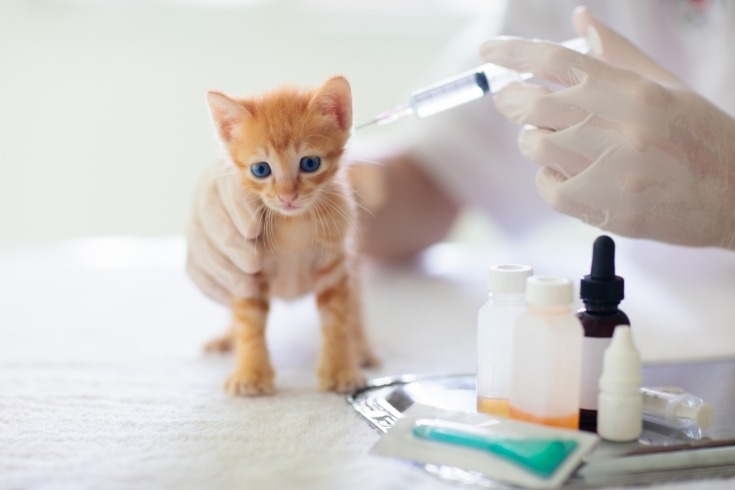
Kittens need to visit the vet for their initial vaccinations, followed by a follow-up visit for booster shots. The vet will advise you on parasite control, weigh your pet to ensure she’s developing correctly, and discuss microchipping and neutering.
The average charge for a routine kitten check-up costs between $50 and $100, including vaccination charges.
Sick/Miscellaneous Visits
The consultation fee for a miscellaneous visit when your cat is sick is around $50 to $150, depending on what treatment the cat needs. For example, if diagnostic tests are required, the fee will be more.
Vaccinations
Cats in the US typically need several core vaccinations to protect them against various common feline diseases. Even indoor cats are at risk of contracting these conditions, so it’s essential to have your pet vaccinated and to keep up with booster shots.
Essential vaccinations for cats include the rabies vaccine, which is required by law in most states, and the FVRCP vaccine, which protects against feline viral rhinotracheitis, calicivirus, and panleukopenia. Some cats might also need non-core vaccinations, such as the feline leukemia vaccine, depending on their lifestyle and risk factors.
The cost of vaccinations can vary depending on the veterinary practice and the location, but on average, a core vaccination for cats usually costs between $20 to $45 per vaccine. Non-core vaccines can be more expensive, costing around $30 to $50 per vaccine.
It’s important to note that in addition to the cost of the vaccine itself, there may be additional fees for the veterinary check-up, administering the vaccine, and any required follow-up visits. With that in mind, it’s best to ask your local veterinary practice for their vaccination charges.
Behavioral Changes
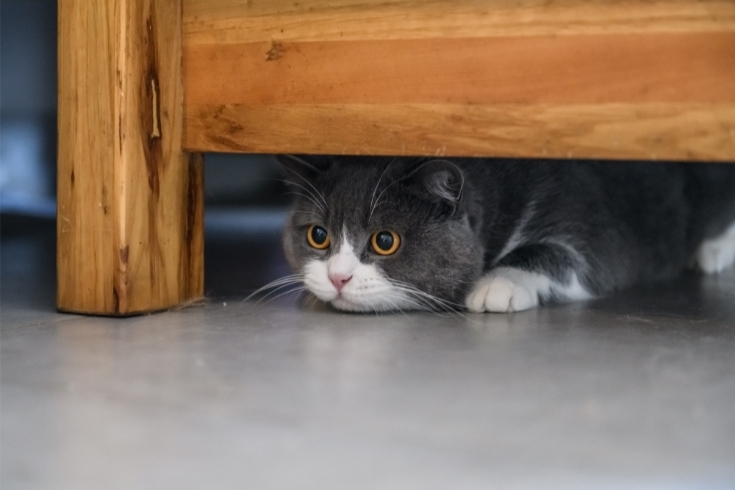
Certain behavioral changes in your cat, such as increased aggression, territorial marking or spraying, litter box changes, and unexplained lethargy, are all reasons to have your cat checked by a vet. These behavioral changes are uncommon and could be caused by an underlying health condition your cat is hiding.
Again, the cost of vet visits to check your cat’s behavioral changes depends on what diagnostic tests are carried out and any medication or therapies that are required. However, the cost of an initial consultation is likely to be between $50 and $100 plus any extras.
Digestive Issues
If your cat suffers from digestive issues, such as vomiting or diarrhea, that can often be caused by your pet eating something, such as a mouse or dumpster diving for scraps.
A cat vet visit to investigate gastroenteritis, vomiting, and other digestive complaints will generally cost you around $500 or more, depending on any medication, tests, and treatment required.
Changes In Eating Or Drinking Habits
If your cat stops eating or suddenly appears incredibly hungry, it’s wise to have a vet check her over. Similarly, if your cat stops drinking or drinks excessively, that could indicate a health problem that needs further investigation.
The cost of a cat vet visit for changes in eating or drinking habits is typically upward of $200.
Weight Loss Or Gain
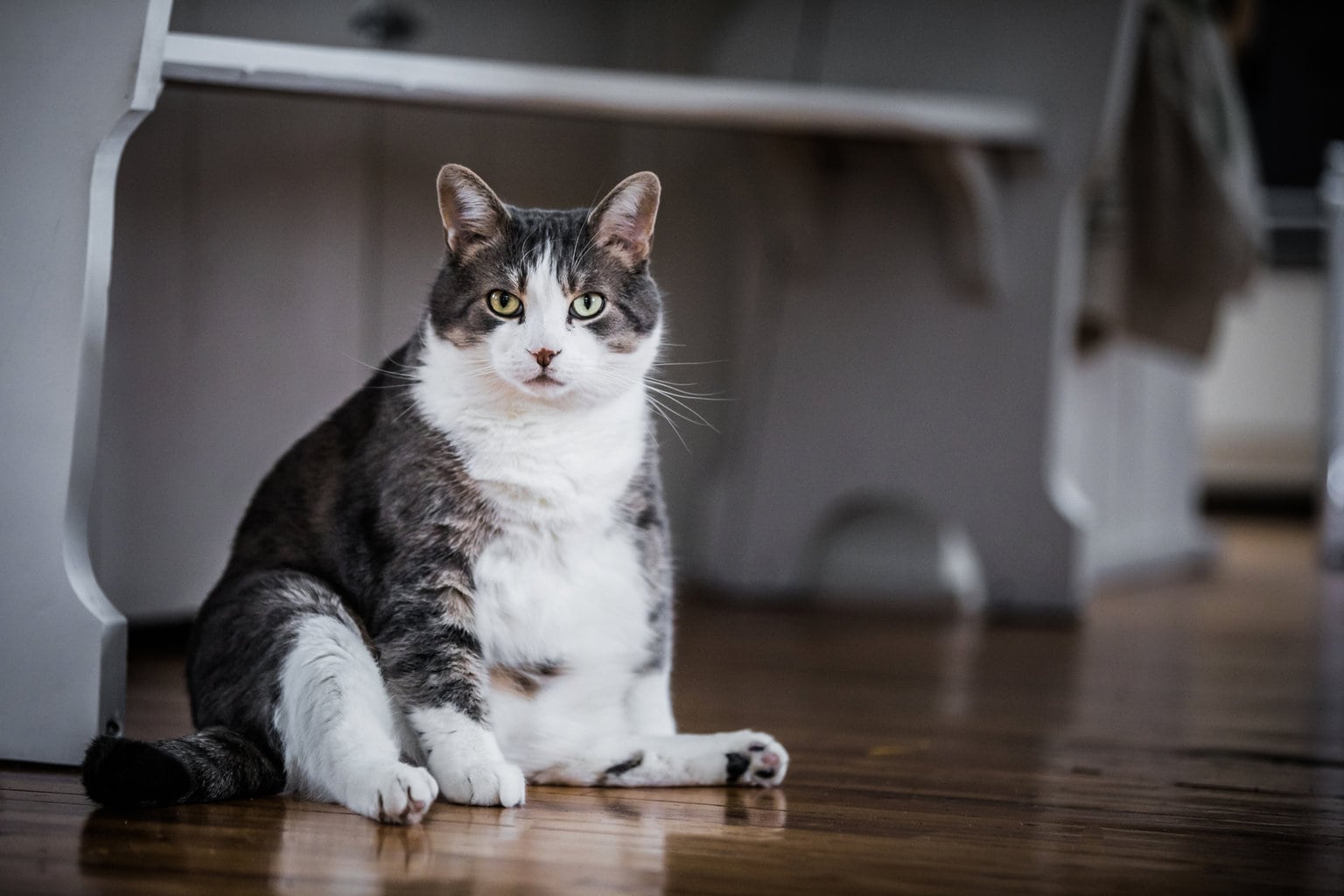
Weight loss or gain can be caused by health conditions such as hyperthyroidism or it could be that your cat has dental problems, which make eating very painful so she eats less and therefore loses weight.
Overweight cats risk health complications such as diabetes, cardiovascular disease, and mobility issues caused by arthritis and other joint problems. So, if your cat loses or gains weight, we advise taking her to the vet for a check-up.
The cost of a veterinary visit to investigate weight gain or loss is typically $500 or more, depending on what diagnostics are required.
Breathing Problems
Breathing problems are quite common in overweight and obese cats, but they can also indicate cardiovascular problems. If your cat has breathing difficulties and the exercise intolerance that generally goes with that, you should get her checked by your vet.
A vet visit for cat breathing problems is generally around $485 and upward.
Lethargy
Cats are notorious for snoozing and napping throughout the day, but if your cat suddenly becomes much less active and seems uninterested in playtime or going outside to indulge in her normal hunting behavior, she could have an undiagnosed health problem that needs veterinary investigation.
The diagnostic costs for investigating lethargy in cats are pretty high, typically around $1,900.
Skin And Coat Issues
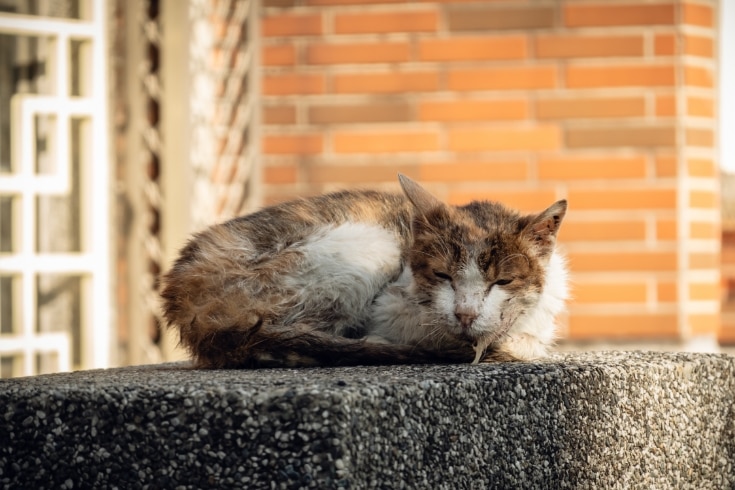
Cats can develop skin and coat issues, which are typically caused by food allergies or parasite activity. Sometimes, old cats find it physically difficult to groom themselves, which can cause problems such as matted hair. In addition, if your cat starts losing her fur or begins scratching, causing sores, you should take her to the vet.
The cost of a vet exam for a cat with skin problems can range from $50 to $200 or more, depending on the location, the complexity of the issue, and additional tests or treatments needed.
Dental Problems
Cats sometimes suffer from broken or loose teeth, abscesses, and gum disease. If your cat gets stinky breath or starts struggling when she’s eating, that’s a typical sign of dental problems, and you should take her to the vet to get her checked over.
The cost of a vet exam for a cat with dental problems can vary widely but typically ranges from $100 to $1300 or more, depending on the extent of the dental issues and any necessary treatments or procedures.
Injuries
Outdoor cats can be injured in car accidents or as a result of fights with other animals. That can result in minor or more severe injuries, necessitating a vet visit. Injuries caused by other animals, especially bites and scratches, often become infected, leading to abscesses and other complications.
I remember when one of my cats was bitten on his shoulder, resulting in a nasty infection and abscess that took several courses of antibiotics to clear. That vet bill amounted to over $300 by the time we’d done!
The cost of a vet visit for an injury varies from $100 to many thousands, depending on the injury and the treatment required.
Eye Or Ear Issues
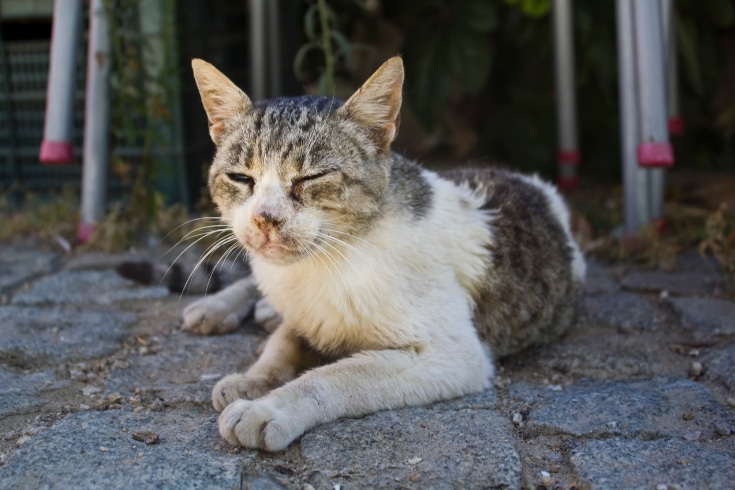
Cats can suffer from eye and ear issues, including ear mites, conjunctivitis, glaucoma, and cataracts. We recommend taking your cat to the vet if she has ear or eye issues, as those can be serious, life-changing conditions if left untreated.
The cost of a vet visit for eye and ear conditions varies from upward of $100, depending on the condition and the treatment required.
Parasite Prevention
Both indoor and outdoor cats can suffer from parasites, including several types of worms, fleas, and ticks. Regular vet visits are essential to prevent parasites from attacking your cat, although you can buy suitable prevention products online, which are generally quite a bit cheaper than those supplied by your vet.
The cost of a parasite prevention vet exam for a cat typically ranges from $50 to $150, which includes the examination and prescription of preventive medications like flea and tick control, and deworming.
Before Traveling
Cats need a vet visit before traveling, especially for long-distance trips or international travel, to ensure they are in good health, have up-to-date vaccinations, and obtain necessary documentation, such as a health certificate. This is done to prevent the spread of diseases, ensure the safety and comfort of the cat during the journey, and comply with regulations imposed by airlines or the destination country.
The cost of a vet visit before traveling can vary widely depending on what you need, but it typically ranges from $50 to $200 or more, including the examination, vaccinations, and certification. Additional costs may apply for any necessary tests or treatments.
What Are The Signs That You Should Take Your Cat To The Vet?
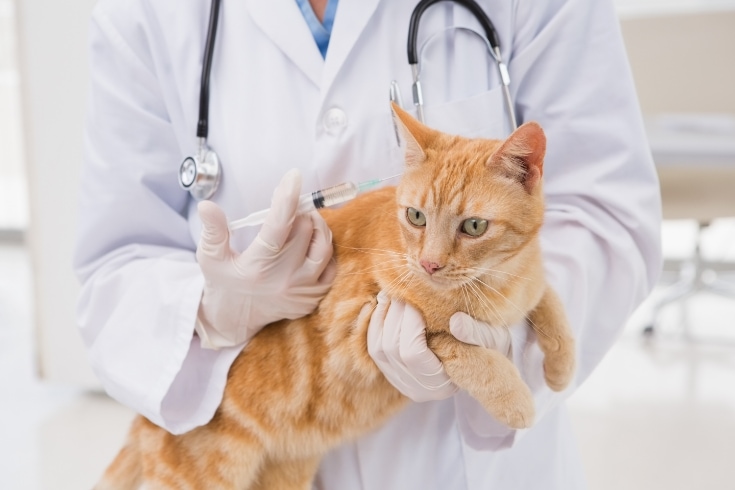
The signs you should take your cat to the vet include behavioral changes, unexplained eating or drinking habits, tummy upsets, breathing problems, ear or eye issues, and any form of injury.
Here’s an overview of the most common signs indicating that you need to take your cat to see the vet.
Changes In Eating Or Drinking Habits
Cats are pretty much creatures of habit when it comes to eating and drinking. I know both my cats always appear at the same time each day for breakfast and dinner, and if either of them doesn’t want to eat, I know they are not feeling great.
If your cat is eating or drinking less or more than usual, it’s certainly worth phoning your vet and asking for their advice.
Changes In Behavior
Once you know your cat, you will notice her familiar behavioral patterns.
For example, during the summer weather, both my cats spend a lot of their time outside in the back garden. However, once changes in fall and winter, the cats prefer to spend their time indoors where it’s warm and dry. If either of the cats decided to stay out overnight when it was raining, that would be an unusual and untypical behavior that I would question.
If your cat suddenly starts behaving very differently from the norm, that could indicate an underlying health problem, and a call to your vet is advised.
Gastrointestinal Issues
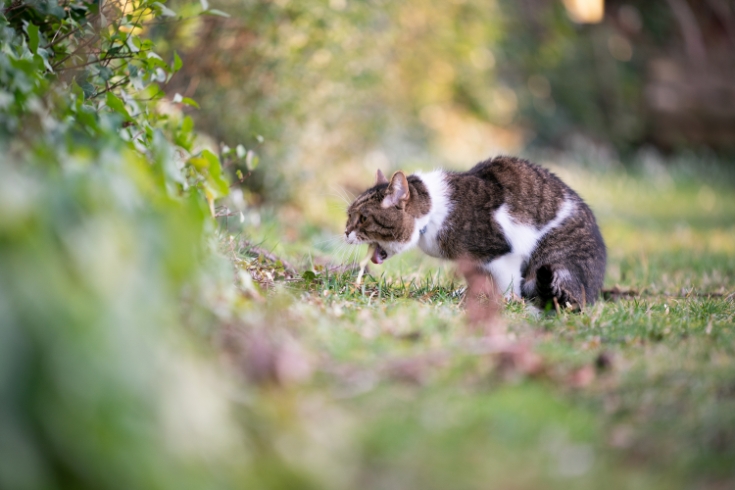
Cats with access to the outside can get tummy upsets through eating prey items they’ve caught, and that’s why it’s so essential to deworm your cat regularly. However, if your cat has diarrhea or vomiting that lasts for more than a couple of hours, you should have her examined by your vet to rule out a more serious cause.
Respiratory Symptoms
If your cat develops breathing problems like labored breathing (dyspnea), wheezing, or struggling to catch her breath after moderate exercise, she could have a serious respiratory problem like asthma, heart failure, or anemia.
Skin And Coat Problems
Skin and coat problems can be caused by parasites, allergies, and skin infections. Sometimes, a senior cat with arthritis might struggle to groom herself, and her coat could become matted. in all these cases, it is advisable to seek veterinary advice.
Eye Or Ear Issues
If your feline friend experiences eye or ear problems like conjunctivitis, cataracts, glaucoma, or ear mites, it’s important to seek veterinary care immediately. These issues can have a significant impact on your pet’s well-being if left untreated.
Changes In Litter Box Behavior
Cats are generally very clean creatures that will not relieve themselves outside of their litter box. However, inappropriate toileting behavior can be caused by health problems such as urinary tract infections, bladder stones, and kidney disease. So, if your cat’s litter box is clean and placed somewhere that’s easily accessible for your furry friend, you should seek veterinary advice if she stops using it.
Limping Or Mobility Issues
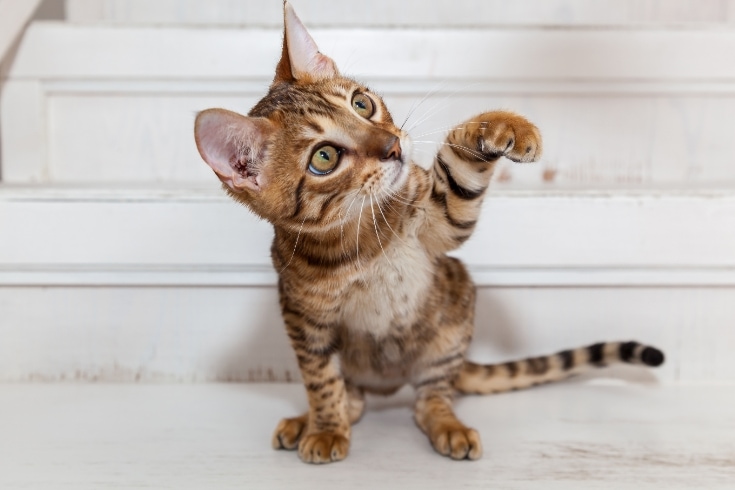
Cats are generally active animals that enjoy interactive games, exploring their neighborhood, and hunting your local rodent population, so, a cat that’s limping or has mobility issues will be miserable and stressed.
Limping can be caused by arthritis in older cats, although in younger animals, the problem is most likely down to an injury. In either case, your cat should be checked by a vet.
Changes In Grooming
There can be various reasons for changes in grooming habits in cats. Some common causes include skin conditions, pain or discomfort, obesity, dental problems, stress, and aging. It’s essential to monitor your cat’s grooming behavior and seek veterinary care if you notice any significant changes.
Unusual Vocalization
Unusual vocalization in cats is generally caused by discomfort or pain, especially when the cat is handled. However, excessive meowing and yowling at night can be caused by feline cognitive dysfunction or dementia, and a vet check-up is recommended.
Digestive Problems
Cats that have access to the outdoors are at risk of developing digestive problems from eating the prey they catch. However, if your cat is experiencing vomiting or diarrhea that persists for more than a few hours, you should have her looked at by a veterinarian to rule out any potentially serious underlying causes.
How Do You Treat A Sick Cat Without Going To The Vet?
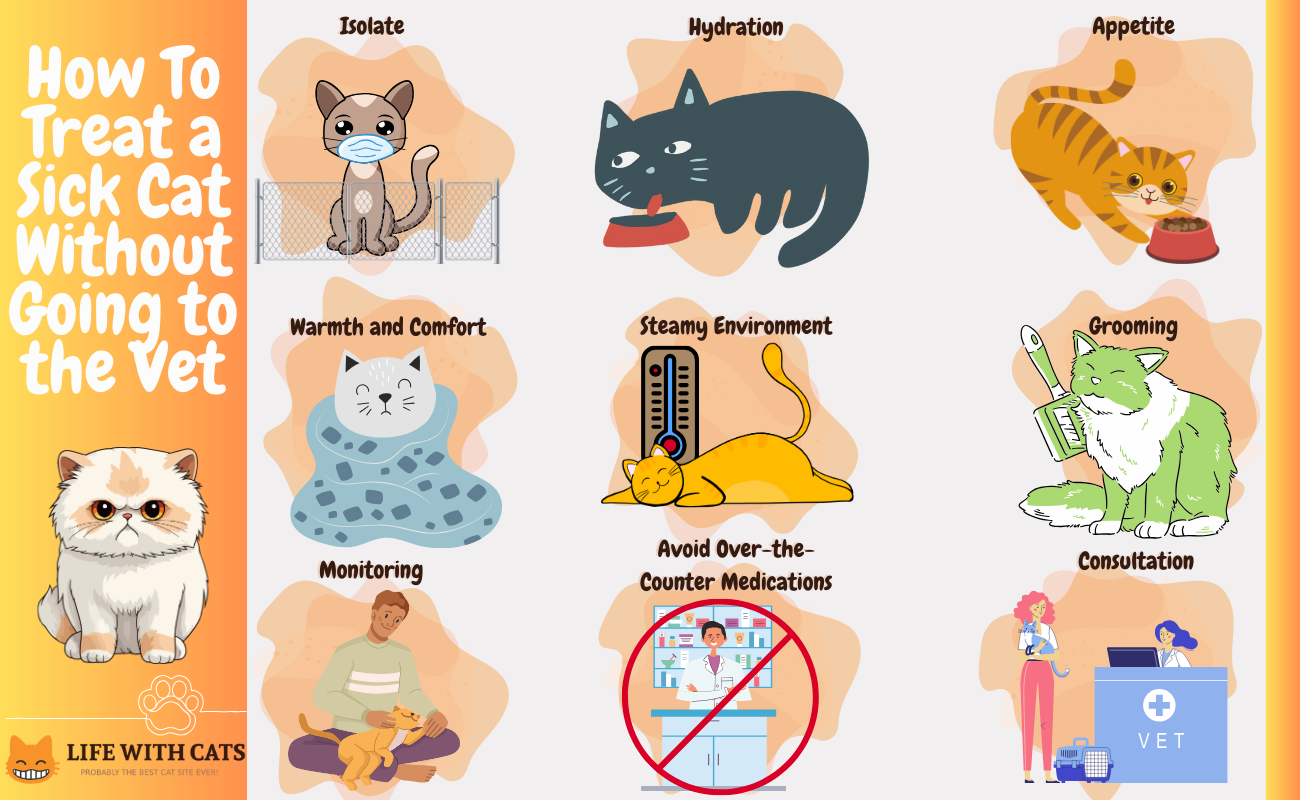
Treating a sick cat at home without going to the vet has pros and cons. If you don’t have veterinary experience, you could worsen the problem, leaving your cat in pain and distress. However, you could save yourself a pile of cash if the cat’s condition is minor and doesn’t need veterinary attention.
For example, one of my young cats, Tia, came in from a night out on the tiles with a bloody ear, presumably from a scrap with a neighboring feline or a feisty rodent. Other than a bit of cosmetic damage, Tia was fine, ate her breakfast, and headed off to bed. I examined her for further damage and found none, so I washed her ear in warm water and left it to heal. Now, Tia has a tiny nick out of one ear but she recovered fully without the need for a vet visit.
If you decide to treat your cat at home or you’re looking after a cat recovering from surgery, here are some top tips on aiding your pet’s speedy recovery.
Isolate
A sick cat will appreciate being alone while she recovers, so find somewhere peaceful, quiet, and warm where your kitty can sleep and get better. In addition, if you have a multi-cat household, a cat with a potentially contagious disease should be kept away from her housemates to prevent cross-infection.
Hydration
Cats are notoriously bad at taking on plenty of fluids, so be sure to provide a recuperating cat with fresh water 24/7. If your cat is eating well, it’s a good idea to give her wet food to help keep your pet well-hydrated.
Appetite
When you’re sick, you often have no appetite, and it’s the same for your cat. So, when nursing a poorly kitty, you might need to tempt her with her favorite foods or even substitute her regular food with something special to encourage her to eat.
Warmth And Comfort
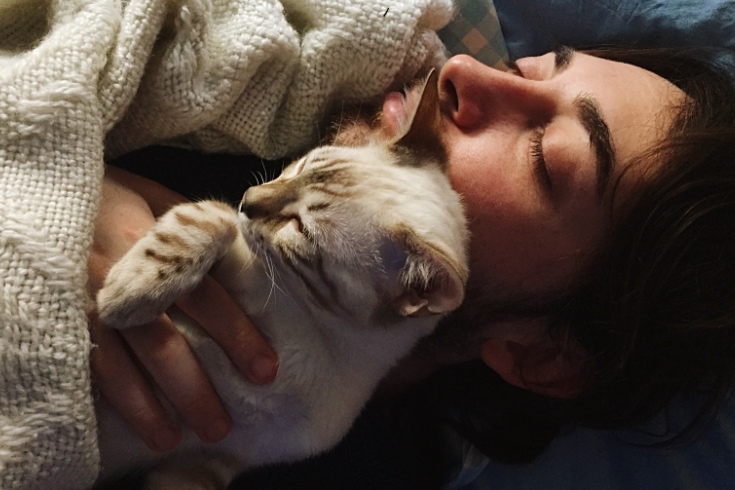
A recuperating cat must be kept warm and comfortable, so choose a cozy spot for your cat to rest and provide her with a snug bed to curl up in.
Steamy Environment
A cat with airway congestion will often benefit from increased environmental humidity, such as being taken into a steamy environment like your bathroom for 10 to 15 minutes a couple of times a day.
Grooming
If your cat is sick, she probably won’t feel much like grooming herself, so it’s up to you to help keep your cat’s coat and skin in good condition by brushing her every day. When grooming your cat, handle her gently, and if she objects to your attention, it could be best to leave brushing her until she feels better.
Monitoring
Monitor your cat throughout her sickness and recovery. That way, you will see if your treatment is working and your cat is getting better or if she is going downhill and needs to be seen by a vet.
Avoid Over-The-Counter Medications
Many pet owners make the mistake of administering over-the-counter pain relief medication, such as paracetamol and ibuprofen, to their pets. However, these drugs can be highly dangerous to animals and cause severe liver and kidney damage, and even death. It’s important to note that even children’s medication is inappropriate for pets. Specifically, paracetamol is particularly toxic to cats and would never be prescribed by a veterinarian.
If your cat is in pain or discomfort, I recommend you consult your vet for advice and don’t try to self-medicate your pet.
Consultation
There are circumstances when caring for your cat at home will be recommended by a vet under their guidance, such as when your pet is recovering from surgery. However, in that case, you will still need to take your cat to the vet for a check-up consultation periodically until she has fully recovered and been signed off by the vet as fully fit.
FAQs
In this part of our guide, we answer some of the most frequently asked questions about how often and when you need to take your cat to the vet.
Is It True That Indoor Cats Need Fewer Vet Visits?
Indoor cats might need fewer vet visits than outdoor cats because they are less likely to suffer injuries and pick up parasites. However, indoor cats still require regular checkups to maintain their health and can still develop health problems, so it’s important to stay on top of their veterinary care with regular checkups.
What Vaccinations Are Essential For My Cat’s Well-Being?
It is important to protect your cat against common feline diseases, which is why several core vaccinations are needed for cats in the US. Even indoor cats can be at risk of getting sick, so vaccinating your pet and keeping up with booster shots is crucial.
The required cat vaccinations include the rabies vaccine, which is mandatory in most states, and the FVRCP vaccine, which guards against feline viral rhinotracheitis, calicivirus, and panleukopenia. Depending on their lifestyle and risk factors, some cats might also require non-core vaccinations like the feline leukemia vaccine.
How Can I Help My Cat Feel Less Stressed About Vet Visits?
Start familiarizing your cat with her cat carrier by leaving it out and occasionally placing treats or toys inside. Use calming pheromone sprays or wipes inside the carrier and have a few dry runs, making short car trips before returning home. Praise your cat and use positive reinforcement to show her how clever she’s been.
Schedule regular “practice” visits to the vet for non-invasive check-ups or just to get treats and positive reinforcement in the waiting room. Always reward your cat with treats or playtime after the vet visit to create a positive association with the experience.
Are There Home Remedies To Keep My Cat Healthy Between Vet Visits?
Yes, there are several things you can do to help keep your cat healthy between vet visits.
First and foremost, maintain a balanced diet with high-quality cat food to ensure your pet gets the right nutrients. Regular grooming helps to prevent matting and hairballs, together with dental care like brushing their teeth, can also help. Keep your cat’s living environment clean and ensure she is up-to-date on vaccinations and parasite prevention.
Most importantly, spend plenty of quality time with your cat to give her the mental and physical stimulation she needs, and keep an eye out for any unusual behavior or signs of illness to catch potential issues early.
Should I Take My Senior Cat To The Vet More Often?
Yes, it’s a good idea to schedule vet visits every six to nine months for your senior cat. That can help highlight any health problems that might be brewing before your pet gets sick and needs urgent veterinary care.
What Can I Expect During A Kitten’s First Vet Visit?
Your kitten’s first vet visit is an important step in ensuring their health and well-being. Here’s what you can expect!
The vet will start by giving your kitten a thorough physical examination. They’ll check for any signs of illness, congenital conditions, or parasites.
Depending on your kitten’s age and vaccination history, she might receive her first set of vaccinations, including feline distemper (panleukopenia), feline viral rhinotracheitis, and calicivirus.
The vet may request a fecal sample to check for intestinal parasites like worms and provide your kitten with treatment if necessary. Preventive measures like flea control, heartworm prevention (especially for outdoor cats), and spaying/neutering at the appropriate age will also be discussed.
You’ll have the opportunity to ask questions about your kitten’s diet and behavior and discuss any concerns you have with the vet. In addition, the vet can offer advice on nutrition, litter training, and behavior management.
Some vets offer microchipping services during the first visit, which is recommended as that’s a good way to ensure your kitten can be identified if she ever gets lost.
Remember to bring any medical history or paperwork you received when adopting or purchasing your kitten and be sure to ask any questions you have about caring for your new feline friend. The first vet visit helps establish a baseline for your kitten’s health and sets the foundation for a lifetime of excellent care.
Can I Spread Out Vet Visits To Manage The Costs?
Yes, you can definitely spread out vet visits to help manage the costs and many pet owners do that to make it more budget-friendly. However, there are a few things to keep in mind when planning
Make sure you stay on schedule for your cat’s essential vaccinations, especially for kittens. Some vaccines require multiple doses in a short period, so talk to your vet about spacing them out without compromising your pet’s health.
Annual check-ups are crucial to catch any potential health issues early, but if you’re trying to save money, you might consider going every 18 months instead of every year, but don’t skip these altogether. Of course, if you have a senior cat, it’s actually better to arrange more frequent check-ups.
Even if you’re spacing out regular vet visits, it’s wise to have an emergency fund set aside for unexpected vet expenses, as cats can get into all sorts of expensive mischief! Some vets operate a budget plan where you pay a monthly premium that’s used to cover the cost of vaccinations and routine treatments throughout the year, helping to spread the cost.
Are There Alternatives To Traditional Veterinary Clinics?
Yes, there are several alternatives to traditional veterinary clinics, depending on your pet’s needs and your preferences.
Some vets offer mobile services, which means they come to your home, which can be incredibly convenient, especially for cats who get stressed during car rides or in a clinic environment.
With the advancement of technology and in response to the recent Covid 19 pandemic, many vets now offer telemedicine consultations. You can discuss your pet’s health concerns via video chat or even send pictures and videos, and although that isn’t suitable for all situations (like emergencies), it can be great for minor issues or follow-up appointments.
If you’re interested in holistic or alternative treatments for your pet, you can look for vets who specialize in these areas. Holistic vet clinics typically offer acupuncture, Reiki, chiropractic care, herbal remedies, or other non-traditional approaches.
Some pet health insurance companies and wellness plans provide access to a network of veterinary professionals, which can give you more options and potentially reduce costs.
Some pet supply stores now offer in-house clinics that offer basic veterinary services, like vaccinations, check-ups, and microchipping, and that can be convenient if you’re shopping for pet supplies anyway.
How Do I Prepare My Cat For A Vet Visit To Ensure Accurate Results?
Before a vet visit where your pet is to have tests and diagnostic procedures, you should check with the vet to see if it’s necessary to withhold food for a certain length of time before the tests. It’s the same with hydrating your pet. Some tests are inaccurate if your pet hasn’t drunk a certain volume of water in the hour or two preceding the test.
Conclusion
When it comes to knowing how often to take your cat to the vet, your cat’s age and overall health are the main considerations.
It’s important to take your cat to the vet clinic for regular vaccinations and health checks. Additionally, you should take your feline friend to the vet if she experiences significant weight gain or loss, unexplained changes in behavior, or shows signs of illness. It’s also necessary to have your cat health-checked before traveling by air to certain countries and for parasite prevention advice.
If your cat develops a stomach upset, breathing difficulties, lethargy, or stops eating, it’s advisable to take her to the vet. These symptoms are often indicative of a health issue that requires veterinary care and shouldn’t be ignored.
While minor illnesses can be treated at home, it’s essential to seek veterinary advice when your cat is sick, even if it turns out that she doesn’t need a physical consultation.